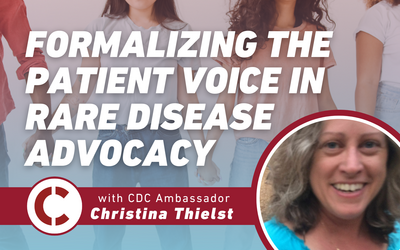
By Christina Thielst, CDC Ambassador
I spent my career as a healthcare professional, working in hospitals and administrative capacities – always advocating for patients and staff. My experience in the workforce cemented my belief that patients always need an advocate.
But as a patient with Guillain-Barré Syndrome and Chronic Inflammatory Demyelinating Polyneuropathy (GBS/CIDP), I learned that sometimes our resources and supports are limited, especially for those of us diagnosed with a rare disease. The Center for Disease Control and Prevention estimates that only about 3,000 to 6,000 people are diagnosed with GBS/CIDP in the United States each year.
Although my disease is considered rare, I encounter situations in which many chronic patients find themselves in: Explaining the symptoms of my condition to friends and family, outlining to colleagues the accommodations I need to be successful at work, trouble affording medications, and the list goes on. That is why I got involved in patient advocacy through the Chronic Disease Coalition.
While I share many experiences with other chronic patients, some of my experiences have been unique to my disease. For example, it took quite a long time to receive an accurate diagnosis from a provider that could prescribe appropriate treatment.
And that is why I sought an appointment to a position on Nevada’s Rare Disease Advisory Council (RDAC). Only a handful of states have established RDACs, and Nevada’s is one of the more recent. Legislation passed in 2019 that created the council and set our directives – primarily to study and recommend public policy solutions to help Nevadans manage their rare diseases.
I started my term of service on Nevada’s RDAC last year.
The RDAC is required to have certain members, like physicians and nurses and hospital administrators. But most importantly, it’s also required to have patient representation. Bringing the patient voice to the table at the conceptual stage of policymaking is such a critical element of sound public policy.
I am thrilled that there are efforts underway around the country to establish RDACs in each state. With February 28 being Rare Disease Day, it’s the perfect opportunity to shine a light on my experience and advocate for patients with rare diseases by formalizing their participation in the public process.